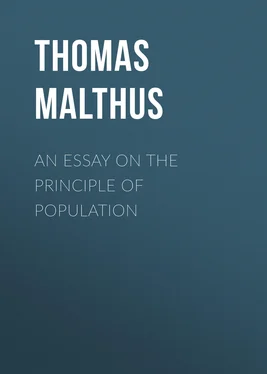Thomas Malthus - An Essay on the Principle of Population
Здесь есть возможность читать онлайн «Thomas Malthus - An Essay on the Principle of Population» — ознакомительный отрывок электронной книги совершенно бесплатно, а после прочтения отрывка купить полную версию. В некоторых случаях можно слушать аудио, скачать через торрент в формате fb2 и присутствует краткое содержание. Жанр: foreign_edu, sociology_book, на английском языке. Описание произведения, (предисловие) а так же отзывы посетителей доступны на портале библиотеки ЛибКат.
- Название:An Essay on the Principle of Population
- Автор:
- Жанр:
- Год:неизвестен
- ISBN:нет данных
- Рейтинг книги:3 / 5. Голосов: 1
-
Избранное:Добавить в избранное
- Отзывы:
-
Ваша оценка:
- 60
- 1
- 2
- 3
- 4
- 5
An Essay on the Principle of Population: краткое содержание, описание и аннотация
Предлагаем к чтению аннотацию, описание, краткое содержание или предисловие (зависит от того, что написал сам автор книги «An Essay on the Principle of Population»). Если вы не нашли необходимую информацию о книге — напишите в комментариях, мы постараемся отыскать её.
An Essay on the Principle of Population — читать онлайн ознакомительный отрывок
Ниже представлен текст книги, разбитый по страницам. Система сохранения места последней прочитанной страницы, позволяет с удобством читать онлайн бесплатно книгу «An Essay on the Principle of Population», без необходимости каждый раз заново искать на чём Вы остановились. Поставьте закладку, и сможете в любой момент перейти на страницу, на которой закончили чтение.
Интервал:
Закладка:
Where there is any inequality of conditions, and among nations of shepherds this soon takes place, the distress arising from a scarcity of provisions must fall hardest upon the least fortunate members of the society. This distress also must frequently have been felt by the women, exposed to casual plunder in the absence of their husbands, and subject to continual disappointments in their expected return.
But without knowing enough of the minute and intimate history of these people, to point out precisely on what part the distress for want of food chiefly fell, and to what extent it was generally felt, I think we may fairly say, from all the accounts that we have of nations of shepherds, that population invariably increased among them whenever, by emigration or any other cause, the means of subsistence were increased, and that a further population was checked, and the actual population kept equal to the means of subsistence, by misery and vice.
For, independently of any vicious customs that might have prevailed amongst them with regard to women, which always operate as checks to population, it must be acknowledged, I think, that the commission of war is vice, and the effect of it misery, and none can doubt the misery of want of food.
CHAPTER 4
State of civilized nations—Probability that Europe is much more populous now than in the time of Julius Caesar—Best criterion of population—Probable error of Hume in one the criterions that he proposes as assisting in an estimate of population—Slow increase of population at present in most of the states of Europe—The two principal checks to population—The first, or preventive check examined with regard to England.
In examining the next state of mankind with relation to the question before us, the state of mixed pasture and tillage, in which with some variation in the proportions the most civilized nations must always remain, we shall be assisted in our review by what we daily see around us, by actual experience, by facts that come within the scope of every man's observation.
Notwithstanding the exaggerations of some old historians, there can remain no doubt in the mind of any thinking man that the population of the principal countries of Europe, France, England, Germany, Russia, Poland, Sweden, and Denmark is much greater than ever it was in former times. The obvious reason of these exaggerations is the formidable aspect that even a thinly peopled nation must have, when collected together and moving all at once in search of fresh seats. If to this tremendous appearance be added a succession at certain intervals of similar emigrations, we shall not be much surprised that the fears of the timid nations of the South represented the North as a region absolutely swarming with human beings. A nearer and juster view of the subject at present enables us to see that the inference was as absurd as if a man in this country, who was continually meeting on the road droves of cattle from Wales and the North, was immediately to conclude that these countries were the most productive of all the parts of the kingdom.
The reason that the greater part of Europe is more populous now than it was in former times, is that the industry of the inhabitants has made these countries produce a greater quantity of human subsistence. For I conceive that it may be laid down as a position not to be controverted, that, taking a sufficient extent of territory to include within it exportation and importation, and allowing some variation for the prevalence of luxury, or of frugal habits, that population constantly bears a regular proportion to the food that the earth is made to produce. In the controversy concerning the populousness of ancient and modern nations, could it be clearly ascertained that the average produce of the countries in question, taken altogether, is greater now than it was in the times of Julius Caesar, the dispute would be at once determined.
When we are assured that China is the most fertile country in the world, that almost all the land is in tillage, and that a great part of it bears two crops every year, and further, that the people live very frugally, we may infer with certainty that the population must be immense, without busying ourselves in inquiries into the manners and habits of the lower classes and the encouragements to early marriages. But these inquiries are of the utmost importance, and a minute history of the customs of the lower Chinese would be of the greatest use in ascertaining in what manner the checks to a further population operate; what are the vices, and what are the distresses that prevent an increase of numbers beyond the ability of the country to support.
Hume, in his essay on the populousness of ancient and modern nations, when he intermingles, as he says, an inquiry concerning causes with that concerning facts, does not seem to see with his usual penetration how very little some of the causes he alludes to could enable him to form any judgement of the actual population of ancient nations. If any inference can be drawn from them, perhaps it should be directly the reverse of what Hume draws, though I certainly ought to speak with great diffidence in dissenting from a man who of all others on such subjects was the least likely to be deceived by first appearances. If I find that at a certain period in ancient history, the encouragements to have a family were great, that early marriages were consequently very prevalent, and that few persons remained single, I should infer with certainty that population was rapidly increasing, but by no means that it was then actually very great, rather; indeed, the contrary, that it was then thin and that there was room and food for a much greater number. On the other hand, if I find that at this period the difficulties attending a family were very great, that, consequently, few early marriages took place, and that a great number of both sexes remained single, I infer with certainty that population was at a stand, and, probably, because the actual population was very great in proportion to the fertility of the land and that there was scarcely room and food for more. The number of footmen, housemaids, and other persons remaining unmarried in modern states, Hume allows to be rather an argument against their population. I should rather draw a contrary inference and consider it an argument of their fullness, though this inference is not certain, because there are many thinly inhabited states that are yet stationary in their population. To speak, therefore, correctly, perhaps it may be said that the number of unmarried persons in proportion to the whole number, existing at different periods, in the same or different states will enable us to judge whether population at these periods was increasing, stationary, or decreasing, but will form no criterion by which we can determine the actual population.
There is, however, a circumstance taken notice of in most of the accounts we have of China that it seems difficult to reconcile with this reasoning. It is said that early marriages very generally prevail through all the ranks of the Chinese. Yet Dr Adam Smith supposes that population in China is stationary. These two circumstances appear to be irreconcilable. It certainly seems very little probable that the population of China is fast increasing. Every acre of land has been so long in cultivation that we can hardly conceive there is any great yearly addition to the average produce. The fact, perhaps, of the universality of early marriages may not be sufficiently ascertained. If it be supposed true, the only way of accounting for the difficulty, with our present knowledge of the subject, appears to be that the redundant population, necessarily occasioned by the prevalence of early marriages, must be repressed by occasional famines, and by the custom of exposing children, which, in times of distress, is probably more frequent than is ever acknowledged to Europeans. Relative to this barbarous practice, it is difficult to avoid remarking, that there cannot be a stronger proof of the distresses that have been felt by mankind for want of food, than the existence of a custom that thus violates the most natural principle of the human heart. It appears to have been very general among ancient nations, and certainly tended rather to increase population.
Читать дальшеИнтервал:
Закладка:
Похожие книги на «An Essay on the Principle of Population»
Представляем Вашему вниманию похожие книги на «An Essay on the Principle of Population» списком для выбора. Мы отобрали схожую по названию и смыслу литературу в надежде предоставить читателям больше вариантов отыскать новые, интересные, ещё непрочитанные произведения.
Обсуждение, отзывы о книге «An Essay on the Principle of Population» и просто собственные мнения читателей. Оставьте ваши комментарии, напишите, что Вы думаете о произведении, его смысле или главных героях. Укажите что конкретно понравилось, а что нет, и почему Вы так считаете.












